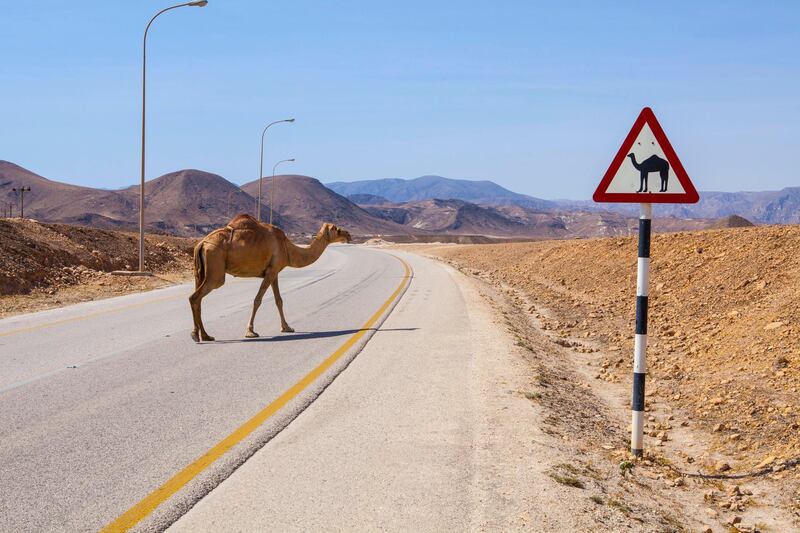Camels in Oman cause the deaths of an average 41 people a year on the roads, contributing to six per cent of all traffic deaths in the sultanate.
Now, in an effort to reduce camel-related road accidents, police are warning owners that they must fit luminous straps onto the backs of their animals when they are outside of their home compounds or face prosecution.
A rule issued by the Royal Oman Police's traffic department on Tuesday, says camels found on streets without luminous straps will be impounded, while their owners could face up to 15 days in prison or a 500 rial fine (Dh4,930) depending on the severity of the offence.
In February, a family of three died instantly in the eastern coastal region of Sharqiyah when the car they were travelling in hit a camel as it crossed the road.
The worst ever traffic accident involving camels in Oman, however, took place in the northern town of Buraimi in 2009. Nine people were killed in that incident, when a bus travelling towards the UAE border crashed after its driver tried to swerve to avoid hitting a herd of camels crossing the road.
Oman has the second highest number of road accidents in the GCC after Saudi Arabia. The last five-year average shows 683 people die every year from an average of 4,612 accidents annually.
Mohammed Al Harthy lost his father in December last year when the car he was driving collided with a camel, while he was on his way back home from work.
"My father was coming around the bend and this camel came from nowhere and got into the road. There wasn't much he could do. The camel owners let them loose in almost every town except in Muscat, out of carelessness more than anything else," Mr Al Harthy, an advocate of the straps, told The National.
But other people who have lost relatives in camel-related accidents said luminous straps would only be effective at night-time and not in the day.
“The luminous straps would make the camel’s body glow in the night. But in the brightness of the sun would not do any good," said Sharaf Al Farsi, a man who lost his mother in a road accident involving a camel in June.
"The government needs to make sure these camels are not let out unsupervised by their owners at anytime.”
Salim Al Dughaishi, who lives close to camel owners in the Barka area of Oman's Al Batnah region, said many owners did not look after their animals properly, which was contributing to the problem.
“They are not responsible at all. They don’t tend to them properly. Many [camels] don’t have proper stables. They are left in the farms just tied up to a tree or are just loose inside a compound. They snap the rope when they are agitated or just kick the gate open and walk out," said Mr Al Dughaishi.
"Some of the owners take them out to feed on wild trees in a desert patch and leave them alone to wander around."





